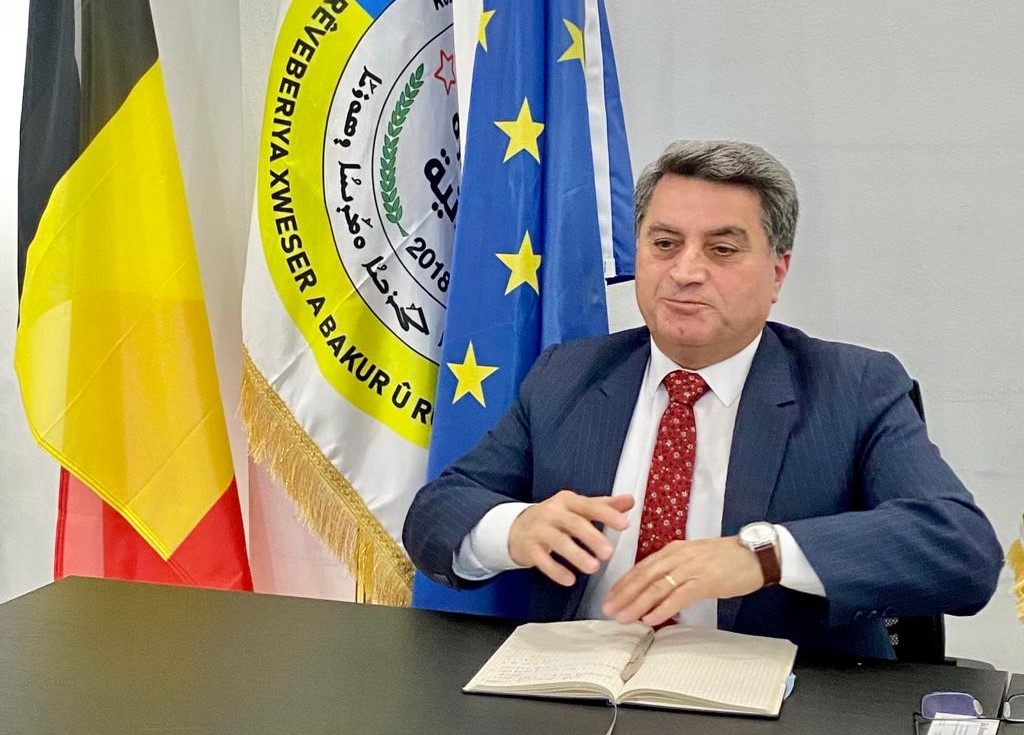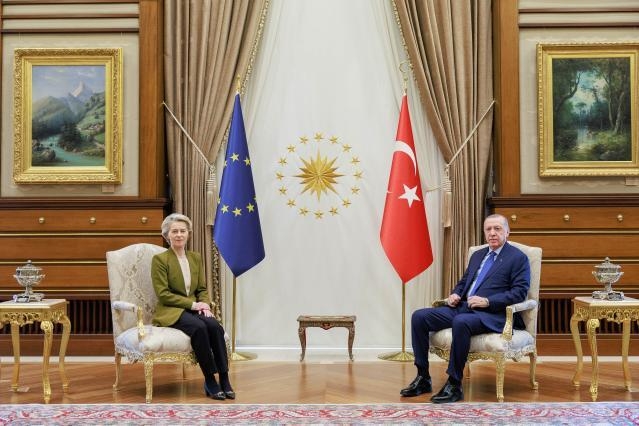The EU is closely following the development in Syria after the fall of the Assad regime and is reaching out to the new leadership in Damascus but the threat of a Turkish invasion of the Kurdish held territory in north-east Syria might upend the hopes for a peaceful and inclusive transition to a better future for Syria.
Turkey is backing the Islamist militia Hayat Tahrir al-Sham (HTS) and is likely to gain most from the fall of the Assad regime. Like other leaders in the region, European Commission President Ursula von der Leyen visited Ankara last week to meet the Turkish President, Recep Tayyip Erdoğan. They talked past each other about Syria and their joint press conference ended without any questions from journalists.
It was only a year ago when the Commission and the previous High Representative for EU’s foreign and security policy presented a joint report on the state of play of EU – Turkey relations. The report proposed bridging the differences between them in a number of political issues that have soured their relations and derailed Turkey’s path to EU membership.
Turkey was back then clearly at odds with EU’s priorities under its Common Foreign and Security Policy (CFSP), maintaining a very low alignment rate of on average 10%, according to the report.
At the press conference, president Erdoğan made it clear that Turkey continues to see the Kurdish militia (YPG) that controls 20 - 25 % of north-east Syria as an extension of the outlawed and terrorist-designated Kurdistan Workers’ Party (PKK) which operates inside Turkey. YPG stands for The People’s Protection Units. Together with its female fighters (YPJ), it played a crucial role in defeating IS in Syria.
In her speech, von der Leyen said that she wants to resume discussions with Turkey on bilateral issues. She also recognized that Turkey has an essential role to play in stabilising the region.
“Together, we must also remain vigilant against terrorism. The risk of a Daesh resurgence, particularly in eastern Syria, is real. We cannot let this happen. Türkiye's legitimate security concerns must be addressed. At the same time, it is important to allow all Syrians, including all minorities, to be safe."
The bilateral issues were not mentioned in the European Council’s conclusions on Thursday. The Council stressed that is sees the “fall of Assad’s criminal regime in Syria as a historic opportunity to reunite and rebuild the country”. A military-strategic alliance between Turkey and an Islamist regime in Syria, as Turkey is expected to demand in return for its support of HTS, would crash the dreams for Syria’s future.
The Council statement underlined “the importance of an inclusive and Syrian-led political process that meets the legitimate aspirations of the Syrian people, in line with the core principles of UN Security Council Resolution 2254. “Syria’s independence, sovereignty and territorial integrity within secure borders should be fully respected, in accordance with international law.”
The Council also emphasised “the importance of the fight against terrorism, of the prevention of re-emergence of terrorist groups, and of the destruction of Syria’s remaining chemical weapons stockpiles.”
What does the Commission mean when it says that ‘Türkiye's legitimate security concerns must be addressed’?
“We are concerned about the current situation in the North-East of Syria, and how this might impact stability,” Anouar El Anouni, EU’s new lead spokesperson for Foreign Affairs and Security policy, told The Brussels Times.
While repeating that ‘Türkiye’s legitimate security concerns must be addressed’, he also highlighted the role of the Syrian Democratic Forces (SDF) in the Kurdish-ruled Autonomous Administration in North-East Syria (AANES), which “remains of utmost importance in securing the prisons holding a very high number of Da’esh fighters”.
“The SDF have long played an important and constructive role in the fight against Da’esh. Türkiye’s legitimate security concerns must be addressed. At the same time, it is important to allow all Syrians, including minorities, to be safe.”
“The EU calls on all parties to contribute to putting an end to military confrontation in Syria, allowing all Syrians across regions to finally enjoy security and the opportunity of participating in building the new Syria. Regarding the North-East, we call in particular for the respect of the Kurdish community.”
“In the volatile Syrian context, we must remain vigilant against terrorism. The risk of a Da’esh resurgence, particularly in eastern Syria, is real. We cannot let this happen. Türkiye has a legitimate right and responsibility to fight against terrorism, respecting international law, the territorial integrity and sovereignty of neighbouring states.
Asked about YPG, the People’s Protection Forces in AANES, the spokesperson confirmed that it, contrary to PKK, is not listed by the EU as a terrorist organization. “The EU considers that resuming a credible peace process, aiming for a sustained political solution to the Kurdish issue, is essential for the stability in the region.”

Dr Abdulkarim Omar, foreign affairs representative of AANES
“We believe that President von der Leyen’s statement in Ankara should have been clearer, especially after the changes in Syria,” Dr Abdulkarim Omar, foreign affairs representative of AANES and head of its office in Brussels, told The Brussels Times.
“The future of the Syrian people is an internal issue and should be resolved internally without external intervention. While Daesh/ISIS poses a significant threat, Turkey's attacks and those of its mercenaries on northeast Syria are destabilising the region. We are aware of Turkey's concerns and have no issues with Turkey. We are prepared to resolve all outstanding matters with Turkey through direct dialogue.”
He attended last week a conference in the European Parliament about the future of Syria and met MEPs from most political party groups. Is there support for AANES and the principle of local self-government in Syria?
“Their stance is clear,” he replied. “The Kurdish people and the AANES must play a role in shaping Syria's future and prevent the formation of a radical Islamic government in Syria. It’s imperative to protect all minorities, including the Kurds, and include them in the political process.”
There is a temporary ceasefire brokered by the US between SDF and the Turkish-backed armed groups. Is AANES bracing for a Turkish invasion in case of a breakdown of the ceasefire?
“We are committed to the terms of the ceasefire, but Turkey and its mercenaries are not adhering to it, and the attacks against Kobani, the Tishreen Dam, and Ain Issa continue. If this situation persists, it will lead to two outcomes.
First, it will cause a massive wave of displacement and migration from our region, where 5 million people live, and Europe might be affected. Second, continued attacks will force the SDF to leave their positions and move to the front lines to counter them. This will create a security vacuum in our areas, which Daesh/ISIS and its sleeper cells could exploit to carry out terrorist attacks.”
“They could attempt to liberate the 12,000 Daesh/ISIS prisoners held in our jails and camps, along with their families - in total 45,000, including 30,000 children raised under ISIS's extremist ideology.”
To strengthen the fragile ceasefire, general Mazloum Abdi, the SDF commander, has proposed the establishment of demilitarized zones along the Turkish-Syrian border.
Does the AANES count on support from the US and the EU?
“We believe that their support is extremely important because we were partners in the international coalition against Daesh and still are. We see their support as crucial to secure the future of Syria which protects the rights of minorities, including the Kurds. The whole international community, especially the countries in the region, should help us in building a new democratic Syria.”
Foreign powers, the US, the EU, EU Member States and Arab countries, are eager to reopen contacts with Syria and are sending their diplomats to Damascus. Has the AANES been in contact with the new Islamist leadership about the transition to a new government?
“So far, there has been no direct dialogue with them. There is some direct communication on the ground in Aleppo concerning Kurdish people living in neighboring areas and an indirect dialogue through the US to establish a safe corridor for the displaced people. We are ready for a direct dialogue with HTS to shape Syria’s future.”
How should the transition take place?
“The political transition must be peaceful and involve all components of the Syrian people without excluding any group. This should be achieved through forming a transitional government tasked with preparing a new, democratic constitution that safeguards the rights of all Syrian citizens, particularly the rights of minorities, and recognises decentralisation and women's rights, among others.
Subsequently, free, fair and transparent elections should be conducted under the supervision of the United Nations. After 61 years of Ba'ath rule, 54 years of the Assad regime, and 14 years of civil war in Syria, there must be real change in the country. It must fulfil the aspirations of the Syrian people to live in a democratic state where there is no place for dictatorship and radical Islamist rule.”
M. Apelblat
The Brussels Times

